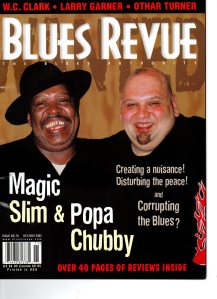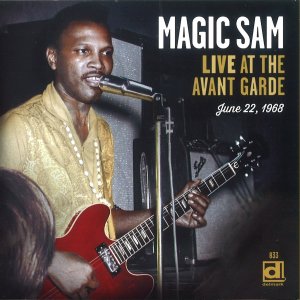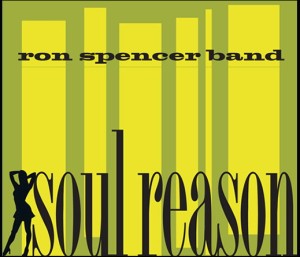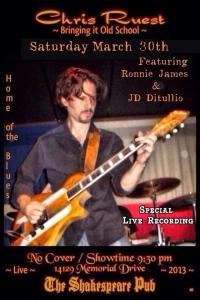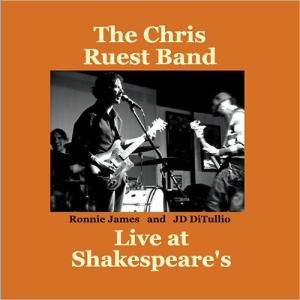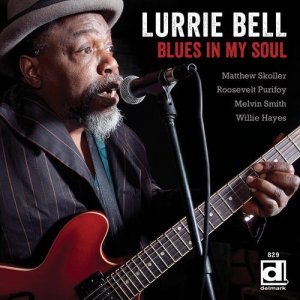

GUY KING
By Myself
I Am Who I Am And It Is What It Is
IBF Records, 2012
guyking.net
Guy King established his credentials in the six years he spent as bandleader for Chicago legend Willie Kent, during which his tough but nuanced lead guitar playing was a major part of The Gents’ hard-edged blues sound. Following Kent’s death in 2006, King embarked upon a solo career. His debut album Livin’ It, on which a new, tightly arranged style, inflected with smooth, jazz-shaded R&B, began to emerge, was nominated for a Blues Music Award; and the guitarist, a native of Israel, seemed to be everywhere at once, appearing nationally and internationally with his blues band, playing solo shows, and fronting an organ trio around Chicago. Then he seemingly fell off the map. As it turns out, King has been spending most of his time abroad, mainly performing in Israel and Brazil. Given that he is preparing to return to the United States for a series of dates scheduled around the 2014 Chicago Blues Festival, now seems a good time to take stock of the two excellent albums King quietly released at the end of summer 2012.
Willie Kent’s gritty electric blues were one thing; the uptown Livin’ It was quite another. What King does on By Myself is completely unexpected. Powerful interpretations of songs by pre-war blues icon Robert Johnson make up nearly half of the 15-song set. King shows a surprising affinity for the form, with a mastery of Johnson’s technique and chords, a snappy, percussive attack that brings a full and expressive sound to the solo guitar, and vocals that shift from full to falsetto, always sounding natural and often impassioned, as when his voice breaks in “Hellhound On My Trail,” where King evokes hopeless resignation in the face of haunting mystery. At the other end of the emotional register is the relatively plainspoken “Steady Rollin’ Man,” also among the strongest performances here. King’s singing takes on a notable resonance and vibrato, appropriately enough, on “Can’t Be Satisfied,” one of two Muddy Waters numbers, and thumps fleet runs on the bass strings of his guitar behind Lightnin’ Hopkins’s “Katie Mae,” which closes this portion of the program.
Don’t despair if Mississippi and Texas blues are not your thing. Five songs at the end of the CD come from an entirely different direction. Still solo, still built on King’s acoustic guitar and evocative singing, they touch on more contemporary and more cosmopolitan musical styles. “I Am Who I Am And It Is What It Is” is a swinging, soulful, upbeat number with a jazzy flair. Next King reprises the sophisticated ballad “Alone In The City,” from Livin’ It. Stripped of its electric instruments and horns, it sounds more like Percy Mayfield or even Charles Brown at his gloomiest–with Ray Charles somewhere at the root of both versions. King overdubs subtle percussion on the last few songs, all in the bossa nova style, beginning with his reading of the jazz standard “Nature Boy,” continuing through his lively cover of Joao Gilberto’s “Acapulco,” and ending with a smoky “Besame Mucho.” This is music for lovers, indeed.
Recorded with Mike Schlick (drums) and Ben Paterson (organ), the two-CD set I Am Who I Am And It Is What It Is offers a cool cruise through jazz and standards, blues and ballads, soul and R&B, and pop. The program begins with a band version of the title track before moving to Charlie Parker’s “Yardbird Suite.” King then shifts from bop to the birth of soul, with an emotional “Drown In My Own Tears.” Next up is a light “Sweet Lorraine,” a rousing “Mojo,” then back to jazz with Stanley Turrentine’s bluesy “Sugar,” and on to Percy Mayfield’s “Please Send Me Someone To Love” and a “Going To Chicago” much toned down from any of the often-heard Joe Williams versions. King’s interest in Brazil comes out in Jobim’s uptempo “Agua De Beber.” Bobby Hebb’s pop smash “Sunny” yields to another Ray Charles ballad before King delivers a wondrous “Tear It Down,” capturing not only Wes Montgomery’s signature octaves but his excitement and effortless swing. Paterson is on fire here, too, and Schlick ably covers the drum breaks.
The second disc unfolds along the same lines, covering standards romantic (“You’ve Changed,” “Moonlight In Vermont”) and frivolous (“The Frim Fram Sauce”); jazz (“Green Dolphin Street” and workouts on McGriff’s “Vicky” and Burrell’s “Kenny’s Sound”); lush ballads from Billie Holiday (“God Bless The Child”) and Stevie Wonder (“Lately”); the breezy Brazilian “Brigas Nunca Mais”; blues (a pitiful “All Over Again,” from B.B. King’s catalog) and R&B (from Ray Charles once more, in a splendid “Roll With My Baby”). As is often the case with organ trios, some of the best material comes from unlikely places. King nods to the soul jazz tradition with sweet pop and elegant soul selections (“Isn’t She Lovely” and “Me And Mrs. Jones”), and surprises with the country weeper “Crying Time,” perhaps learned from Buck Owens, or remembered from bluesman Phillip Walker’s Playboy Records LP. In either case, it is devastating. Overall, the division between instrumentals and vocal numbers is about even, the latter showing King’s pleasant, expressive range, and on virtually every track, King and Paterson trade solos that, even when speaking the language of jazz, retain bluesy phrasing and tonalities. The group has a real feeling for the entire range of styles on What It Is, an absolutely lovely album on many levels.
King’s achievement is all the more impressive when one considers that both albums were recorded virtually off-the-cuff. Inspired after an evening’s gig, King cut the solo album in a single session, using an acoustic guitar belonging to the studio. In much the same way, the 30 songs on the organ trio record were laid down, in much less than 24 hours, during the course of an all-nighter, with a brief follow-up later in the afternoon. One might reasonably wonder if there is anything he can’t do, and where he will take us next. King has in fact been writing and recording new material, with an ear sensibly tilted toward producing great music, without much concern for genre restrictions. The touchstone artists whose work inspired the two works considered here–Muddy Waters, Antonio Carlos Jobim, Stevie Wonder, Nat “King” Cole, and Ray Charles in particular–seem likely to play a continuing role in King’s musical development. That is an evolution I don’t want to miss. In taking the varied music he loves and recasting it in new combinations, Guy King is going about his art the right way. Musicians with genuinely big ears are rare, and talent like King’s is rarer still.
TOM HYSLOP
I bought these CDs from the artist’s Web site.







